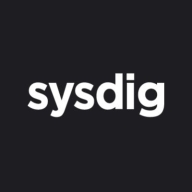


Sysdig Secure and CrowdStrike Falcon Cloud Security compete in the cloud security category. CrowdStrike Falcon Cloud Security has the upper hand due to its superior features and broader security coverage.
Features: Sysdig Secure is praised for comprehensive container and Kubernetes security, runtime protection, and compliance. CrowdStrike Falcon Cloud Security is recognized for endpoint detection and response, threat intelligence, and seamless integration with other security products.
Room for Improvement: Sysdig Secure users suggest enhancing the user experience, reporting features, and completeness of documentation. CrowdStrike Falcon Cloud Security users mention the need for more granular control in configurations, enhancements in data visualization, and additional advanced tweaks.
Ease of Deployment and Customer Service: Sysdig Secure is known for a straightforward deployment process but faces criticism regarding documentation. CrowdStrike Falcon Cloud Security has a streamlined deployment model with consistent praise for its responsive and knowledgeable customer service team.
Pricing and ROI: Sysdig Secure offers competitive setup costs and strong ROI for SMBs. CrowdStrike Falcon Cloud Security, though more expensive, justifies its higher cost with superior performance and broader security capabilities, providing higher ROI for larger enterprises.
| Product | Market Share (%) |
|---|---|
| SentinelOne Singularity Cloud Security | 5.7% |
| CrowdStrike Falcon Cloud Security | 4.9% |
| Sysdig Secure | 3.3% |
| Other | 86.1% |

| Company Size | Count |
|---|---|
| Small Business | 48 |
| Midsize Enterprise | 22 |
| Large Enterprise | 54 |
| Company Size | Count |
|---|---|
| Small Business | 13 |
| Midsize Enterprise | 6 |
| Large Enterprise | 15 |
| Company Size | Count |
|---|---|
| Small Business | 6 |
| Midsize Enterprise | 2 |
| Large Enterprise | 5 |
SentinelOne Singularity Cloud Security offers a streamlined approach to cloud security with intuitive operation and strong integration capabilities for heightened threat detection and remediation efficiency.
Singularity Cloud Security stands out for its real-time detection and response, effectively minimizing detection and remediation timelines. Its automated remediation integrates smoothly with third-party tools enhancing operational efficiency. The comprehensive console ensures visibility and support for forensic investigations. Seamless platform integration and robust support for innovation are notable advantages. Areas for development include improved search functionality, affordability, better firewall capabilities for remote users, stable agents, comprehensive reporting, and efficient third-party integrations. Clarity in the interface, responsive support, and real-time alerting need enhancement, with a call for more automation and customization. Better scalability and cost-effective integration without compromising capabilities are desired.
What are SentinelOne Singularity Cloud Security's standout features?SentinelOne Singularity Cloud Security is deployed in industries needing robust cloud security posture management, endpoint protection, and threat hunting. Utilized frequently across AWS and Azure, it assists in monitoring, threat detection, and maintaining compliance in diverse environments while providing real-time alerts and recommendations for proactive threat management.
CrowdStrike Falcon Cloud Security is a platform of cloud security solutions aimed at protecting organizations from breaches while simplifying cloud security management. The unified platform combines several cloud security functionalities for comprehensive protection. Built on the CrowdStrike Falcon Platform, it leverages the powerful agent and technology used in CrowdStrike's renowned endpoint protection solutions, extending its capabilities seamlessly to cloud environments.
CrowdStrike Falcon Cloud Security is designed to be a shield for the cloud infrastructure. One of its key strengths is its ability to monitor cloud workloads for potential breaches and attacks. It doesn't matter if you're running virtual machines, containers, or a combination of both across different cloud providers – Falcon Cloud Security offers visibility and protection. Additionally, it works tirelessly to pinpoint misconfigurations or vulnerabilities in your cloud setup, proactively stopping issues before they become full-blown security incidents. Compliance becomes easier too, as it can check if your deployments meet the requirements of various industry standards and regulations.
If you heavily utilize containers and Kubernetes, Falcon Cloud Security has you covered. It delves deep into container images and running containers to spot weaknesses and potential threats, helping you secure your containerized applications from the moment they're developed to when they're up and running. Finally, it tackles the often messy world of permissions in the cloud. Falcon Cloud Security analyzes identities and their attached permissions, ensuring that the principle of least privilege is followed and sensitive data isn't exposed due to overly broad access rights.
In essence, CrowdStrike Falcon Cloud Security aims to simplify the complexities of cloud security by consolidating tools, providing a centralized view of your risks and threats, and delivering advanced protection that blends seamlessly with your development processes.
Based on the interviews we conducted with CrowdStrike Falcon Cloud Security users, overall, the sentiment is positive. Users praise the solution's efficacy in detecting and preventing threats, its ease of use, scalability, stability, and integration with existing systems. There were also mentions of areas for improvement, such as the pricing, the user interface, and customer support.
In the cloud, every second counts. Attacks move at warp speed, and security teams must protect the business without slowing it down. Sysdig stops cloud attacks in real time, instantly detecting changes in risk with runtime insights, a unique AI architecture, and open source Falco. Sysdig delivers live visibility by correlating signals across cloud workloads, identities, and services to uncover hidden attack paths. By knowing what is running, teams can prioritize the vulnerabilities, misconfigurations, permissions, and threats that matter most. From prevention to defense, Sysdig helps enterprises move faster and focus on what matters: innovation.
Sysdig. Secure Every Second.
We monitor all Cloud-Native Application Protection Platforms (CNAPP) reviews to prevent fraudulent reviews and keep review quality high. We do not post reviews by company employees or direct competitors. We validate each review for authenticity via cross-reference with LinkedIn, and personal follow-up with the reviewer when necessary.